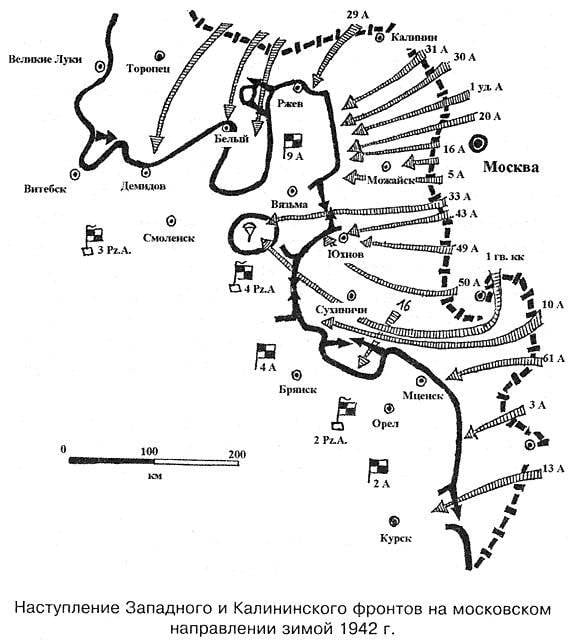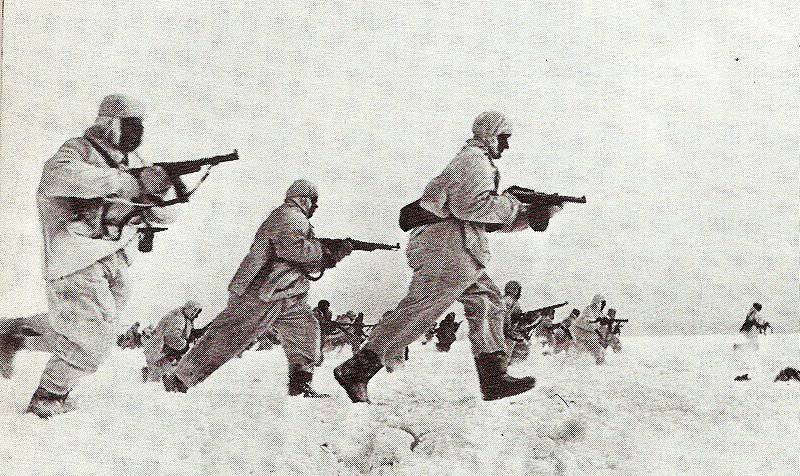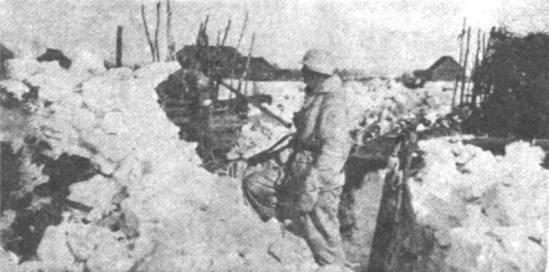1942 Rzhev. Volga. Ice and blood
After the Soviet troops took Kalinin, they launched an offensive on a broad front east of another Volga city, Rzhev. 4 January 1942 of the year, the Soviet motorized brigade 29-th and 4-th shock armies. bypassing the enemy, were already in 8-mi west of Rzhev.

Hitler gave the 9 th army the order: "The 9 th army is not one step back! Hold the line on the Volga, in order to become something!"
Winter paralyzed all the advances of the German troops. But the soldiers of the Red Army, she gave a great advantage. They had not only snowmobiles capable of moving through deep snow, good winter clothing, but above all weaponwhich, unlike the German, did not refuse the bitter cold.
In mid-January, the forward detachments of the Soviet cavalry corps, General Belov, reached the Sychevka region south of Rzhev and cut the Rzhev-Vyazma railway. At the same time, three airborne brigades were parachuted into the Vyazma region, and the 1 Guards Cavalry Corps broke through the enemy defenses in the Yukhnov region in the north-west direction and went to the rear of the German forces, going to the Kalinin front.
Thus, a real threat of full coverage and encirclement of the entire 9 of the German army was created.
The position of the Germans was critical - in fact, the 9-I army was half-armed, with completely exhausted soldiers, without reinforcements and reserves. The communication system between the units and the unified coordination of control were disrupted, the supply of troops with food and ammunition on a single railway line ceased and, in addition, the army commander, Colonel-General Strauss, was out of action.
On January 16, 1942, the commander of the 9th Army was appointed General tank troops Walter Model.
Small, wiry and agile, he was popular in parts of the 41 tank corps. Everyone knew - where the Model, there is a tangible presence of military luck: where it is, succeed the most ambitious designs, the most crisis situations are resolved. And the matter was not only in the exclusiveness and clarity of the orders given to them - everywhere, in the most forward positions, the commander appeared personally. He could unexpectedly jump out of an all-terrain vehicle near the battalion headquarters or ride a horse in deep snow to the front lines, where he inspired, scolded, instructed and eventually went to the attack at the head of the battalion with a pistol in his hand. Largely due to this presence on the front line, the fate of the upcoming battle was decided.
The model understood that only defensive actions could not change the situation. “Attack, intercept initiative from the enemy, impose your will on him”, - such a recipe prescribed Model to subordinates. And although the overwhelming numerical superiority was on the side of the enemy (five Soviet -9, 22, 29,30 and 31th armies acted against his 39 army), he went on the offensive.
It began at a temperature 45 degrees below zero. The regimental and divisional commanders asked the army commander to postpone the operation, to which the Model responded to them:
- What for? Tomorrow or the day after will not become warmer. And the enemy of his offensive does not roll.
Model's plan looked simple. He sent a reinforced 1-th tank division and parts of the newly arrived Reich division from Sychevka to the North-West direction to Osuy to strike at the flank of the advanced Soviet units. 22 January Model gave the order to the 6 Corps to attack from the area west of Rzhev, striking the Soviet units of the 39 and 29 armies. At the same time, the 23 of the German corps — cut off in the Olenin area — struck from the west, going to the junction with the 6 corps. The operation of the two wedges of the German offensive against the Soviet breakthrough between Nikolsky and Solomin was conducted by German units at the limit of forces, but it was a success. On January 23, the soldiers of the head units of the 23 Corps and the Major River Fighting Group from the 6 Corps shook hands.
The two "snow roads" laid by the Red Army across the Volga were cut, and the Soviet corps of the 29 and 39 armies (7 rifle, 3-motorized and 3-x cavalry divisions) were cut off from their rear communications and supply bases.
The model seized the initiative on the battlefield between Sychevka and the Volga, and was not going to give it back to the enemy. The first thing the new commander did was reinforce the newly acquired corridor linking the 6 and 23 corps. Soviet troops were desperately trying to break through the barrier and restore the message with their severed divisions. The model could not allow this.
To accomplish the task, he chose the most suitable person. He was able to find the right people to perform particularly difficult tasks. This time it was Obershturmbanführer Otto Kumm, the commander of the regiment "Der Führer" from the division "Reich". Kumma and his regiment were transferred to the Volga - to the very place where the Soviet 29 Army crossed the frozen river.
“Hold on at all costs,” Model Kummu ordered, “at all costs,” the general emphasized.
Kumm saluted.
- Yes, Mr. General!
January 28 A model in the southern sector of the front launched a counterblow to completely surround the cut off 29 and 39 units of the Soviet armies. The adversary understood what was at stake and desperately resisted.
The fight was not for life, but for death. Each forest hut in deep snow turned into a fortress, the ruins of any house in the village - into a hellish inferno. Critical situations were created more than once, which were resolved only thanks to the inhuman efforts of deadly tired soldiers. In the afternoon, the Model spent about an hour studying maps, and the remaining ten were in the army. Wherever he appeared, the insanely exhausted commanders of the units and the rank and file, as if breathing a second breath.
February 4 ring around eleven Soviet divisions, representing the main forces of the two armies, closed.
Meanwhile, Kumm and his 650 regiment, a man who had taken positions at the village of Klepnino along the ice-covered Volga, repelled, day after day, the attacks of the fresh units of the Red Army, who were striving to join up with their surrounded divisions. It was there, in that place at Klepnino, that the fate of the battle for Rzhev was decided.
Despite its small number, the Kumma regiment was well equipped. At the forefront was the 88mm anti-aircraft gun. Fighter-anti-tank company was armed with 50mm anti-tank guns. A company of heavy weapons consisted of a platoon of light infantry guns, and two more platoons had 37mm anti-tank guns, as well as a battery of assault guns of the 189 division. But even in this situation, the forces of the defenders still remained more than modest compared with the masses of the attacking Soviet units, consisting of several infantry and tank brigades.

For three weeks, Soviet troops constantly attacked day and night. However, they made quite a typical tactical mistake for them - they did not concentrate all their forces on one section of the breakthrough, they did not determine the direction of concentration of the main efforts for themselves. They threw the battalion behind the battalion, then the regiment after the regiment and, finally, the brigade after brigade.
February 3 thirteen 50mm anti-guns Lieutenant Peterman knocked twenty T-34. For five hours, the gun crew of the gun standing there was replaced three times, the next crew was crushed by the T-34. Two dozen wrecked Soviet tanks froze before reaching the German positions.
On the sixth day, thirty light Soviet tanks appeared in front of the company 10 position. They stopped fifty meters away, and then began shooting at infantry dugouts and machine-gun points. They poured them fire for an hour, and then drove back to the forest. Two hours later, a man crawled into the battalion headquarters from the location of the 10 company. It was a rotenführer (corporal) Wagner. He was helped up and put into the room. Severely wounded, with frost-bitten hands, he tried to get up and how to report to the battalion commander. But he fell and reported lying on the floor:
“Hauptsturmführer (captain), out of my company I was left alive. All died.
Wagner convulsed, and in a second the 10-i company finally ceased to exist.
At the turn there was a gap not less than a kilometer wide. The command of the 6 Army Corps threw people, drivers, cooks, shoemakers and tailors, over the 120 hole to be sealed. These 120 people took the positions of the 10 of the company, but they had absolutely no experience in this kind of combat. After mortar shelling, Soviet soldiers rushed at them to attack with shouts of "Hurray!". This turned out to be too much for the nerves of the loggers. They ran and were killed one by one like rabbits.
When it got dark, the Red Army soldiers from the Kumma regiment in Klepenin separated the entire 50 meters.
From the regiment commander to the drivers, everyone prepared to repel the attack, holding carbines, machine guns and machine guns. The headquarters were supported by an anti-tank gun and soldiers of the 561 of the anti-tank battalion, who fought like infantrymen.
No matter how many times Red Army men rushed in the attack, they could not get closer to the headquarters of 15 meters. The words of combat reports from the battlefield are striking in their monstrous simplicity: \ "On the approaches to Klepenin there were mountains of corpses lying around \".
The corps sent an infantry regiment to the rescue. But the Soviet soldiers killed him almost completely. On the night from February 6 to February 7, the enemy finally broke into the position of the 2 Company through the battalion. The most severe hand-to-hand battle lasted four hours. 2-I company of the regiment "Der Führer" fell to the last man.
At that moment, the motorcycle battalion of the Reich division arrived in Klepnino. In addition, units of the 189 division of assault guns under the command of Major Mummert were deployed to help Kumm. 210mm mortars went into position and fired their shells on a broken \ "Russian grove \" Soviet infantry. The grove changed owners ten times. After the eleventh attack, she remained in the hands of Major Mummert’s 14 reconnaissance battalion.

Kumm confidently held positions on the northern tip of a large boiler. The debit brigades of the Soviet 39 army failed to cross the Volga. They bled to death. The bodies of the dead Soviet soldiers on a bend of the Volga lay in thousands.
The battle was coming to an end. The Soviet 29 Army and the bulk of the 39 Army were destroyed. The model, which received the rank of Colonel-General 1 on February, managed to change the course of events of the winter battle on the Central Front. The following data speaks about the scale of the battles and their bloodshed: 5 thousands of Soviet soldiers and officers were taken prisoner, 27 thousands left to lie on the battlefields. Six Soviet rifle divisions were completely destroyed, and another nine plus five tank brigades were seriously battered.
The Germans also suffered heavy losses. On February 18, when Obersturmmbunführer Otto Kumm reported to the division headquarters, the Model just happened to be there. He said to Kumm:
- I know that from your regiment, almost nothing is left. But I can not do without you. What is the current number of personnel?
Kumm pointed toward the window:
- Mr. Colonel-General, my regiment is built.
The model looked out the window. Before the headquarters stood thirty-five soldiers and officers.
Information